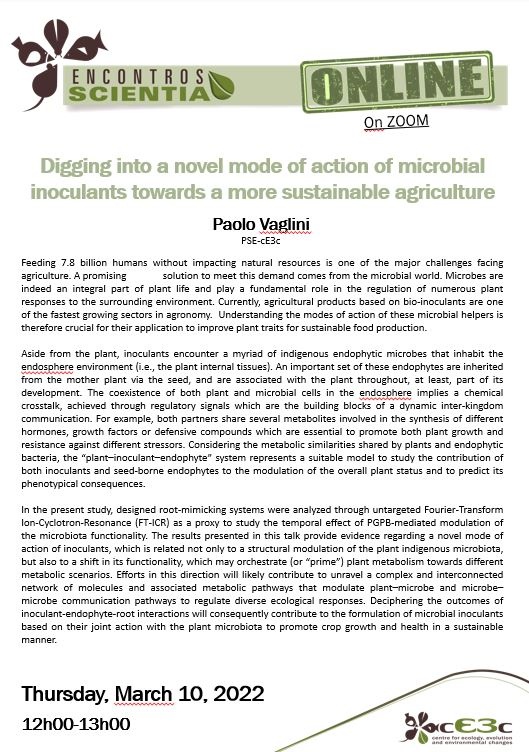Digging into a novel mode of action of microbial inoculants towards a more sustainable agriculture
Paolo Vaglini (cE3c – PSE)
Feeding 7.8 billion humans without impacting natural resources is one of the major challenges facing agriculture. A promising solution to meet this demand comes from the microbial world. Microbes are indeed an integral part of plant life and play a fundamental role in the regulation of numerous plant responses to the surrounding environment. Currently, agricultural products based on bio-inoculants are one of the fastest growing sectors in agronomy. Understanding the modes of action of these microbial helpers is therefore crucial for their application to improve plant traits for sustainable food production.
Aside from the plant, inoculants encounter a myriad of indigenous endophytic microbes that inhabit the endosphere environment (i.e., the plant internal tissues). An important set of these endophytes are inherited from the mother plant via the seed, and are associated with the plant throughout, at least, part of its development. The coexistence of both plant and microbial cells in the endosphere implies a chemical crosstalk, achieved through regulatory signals which are the building blocks of a dynamic inter-kingdom communication. For example, both partners share several metabolites involved in the synthesis of different hormones, growth factors or defensive compounds which are essential to promote both plant growth and resistance against different stressors. Considering the metabolic similarities shared by plants and endophytic bacteria, the “plant–inoculant–endophyte” system represents a suitable model to study the contribution of both inoculants and seed-borne endophytes to the modulation of the overall plant status and to predict its phenotypical consequences.
In the present study, designed root-mimicking systems were analyzed through untargeted Fourier-Transform Ion-Cyclotron-Resonance (FT-ICR) as a proxy to study the temporal effect of PGPB-mediated modulation of the microbiota functionality. The results presented in this talk provide evidence regarding a novel mode of action of inoculants, which is related not only to a structural modulation of the plant indigenous microbiota, but also to a shift in its functionality, which may orchestrate (or “prime”) plant metabolism towards different metabolic scenarios. Efforts in this direction will likely contribute to unravel a complex and interconnected network of molecules and associated metabolic pathways that modulate plant–microbe and microbe–microbe communication pathways to regulate diverse ecological responses. Deciphering the outcomes of inoculant-endophyte-root interactions will consequently contribute to the formulation of microbial inoculants based on their joint action with the plant microbiota to promote crop growth and health in a sustainable manner.
Thursday, March 10, 2022, at 12h00-13h00 (Lisbon, Portugal time)

